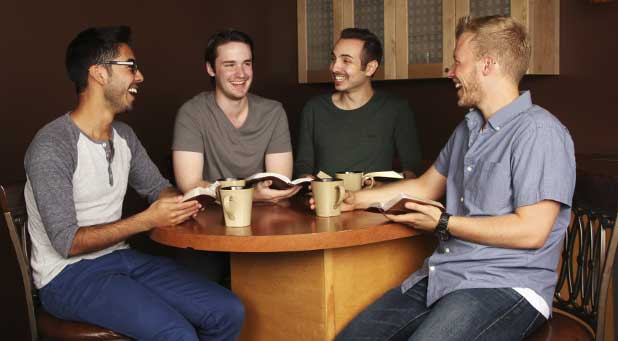God doesn’t want us to live in isolation. I realized many years ago that I desperately need people in my life in order to fulfill my purpose. My parents invested in me, and so did teachers, coaches, employers, pastors, role models and good friends. I am not self-made, and neither are you. Any success we have achieved is the result of someone taking time to instruct, encourage or correct us. That’s humbling!
Mentorship is a basic biblical principle. The book of Proverbs opens with an exhortation to listen not only to parents but also to the “words of the wise” (Prov. 1:6, NASB). Moses mentored Joshua, Naomi mentored Ruth, and Elijah mentored Elisha. Jesus spent most of His time teaching a small group of disciples. One of those, Peter, discipled his spiritual son, Mark (1 Pet. 5:13), who in turn wrote the Gospel of Mark based on Peter’s testimony.
The message of Christ is best transmitted through the process of mentoring. But this art has been lost in today’s church—partly because of family breakdown and partly because our celebrity-obsessed culture values self-effort and instant results. Mentoring is too slow for most of us because we prefer the overnight sensation. God’s kingdom is built through a tedious process we don’t have the patience for.
Yet I believe we can reclaim biblical discipleship. In fact, I’m convinced the church is shifting radically back to God’s original plan as we reject the program-driven, impersonal, televangelistic one-man show of the past season. Everywhere I go I find people who are hungry for authentic relationships that can help them become team players and mature mentors.
I’ve found six types of mentors who have helped me in my spiritual journey:
1. Distant mentors. British author Charles Spurgeon died in 1892, but I consider him a mentor because I read his books often. The same is true of other dead authors such as Andrew Murray and A.W. Tozer. You don’t have to know a person to receive instruction from them. I’ve never met author Henry Blackaby, but his books, especially Experiencing God, have profoundly influenced me.
2. Occasional mentors. Brother Andrew, the founder of the Open Doors ministry, became a hero to me after I read his book God’s Smuggler in the 1970s. Then in 2004, I had the privilege of interviewing him in his home in Holland. Some of the things he said to me that day still ring in my ears. I may never visit him again, but he made an eternal investment in my life.
3. Supportive friends. A mentor does not have to be 20 years older than you. I have a close group of peers who sometimes gather from four states just to pray for each other. We call this group “the band of brothers.” I am constantly on the phone with a few of them. We share prayer requests and offer advice—and we aren’t afraid to step on each others’ toes if necessary. You need friends like that to survive life’s challenges.
4. Negative mentors. Not everyone you meet is a good example. I have sometimes encountered people in positions of leadership who had serious flaws. Some had prideful attitudes; others had poor people skills; a few had selfish agendas. Rather than allowing myself to become bitter or judgmental, I studied their behavior and determined to avoid doing the same things. I said to myself, “Let this be a lesson. That is not how to lead.”
5. Reverse mentors. You can also learn from younger people. I invest in a lot of Timothys, and they love to ask me for counsel. But I sometimes flip roles and pick their brains. One of the guys I’m mentoring, Alex, is a tech geek—so I know he will have the answer when I have a question about my computer, my smartphone or the latest app. I also get regular feedback from the guys I’m mentoring because I want to know if I’m communicating in a way that is relevant to their generation. Sometimes the best way to mentor is to ask questions!
6. Spiritual fathers and mothers. God has used many different mentors in my life, but there are some who invested in me in a very personal way for a long span of time. One of them, Barry St. Clair, invited me to a discipleship group when I was only 15. He taught me the basics of the Christian life during those Bible studies in his basement, and we have stayed connected for 40 years. This month the two of us are doing a conference together in Atlanta! Barry has been a role model, counselor and spiritual father most of my life, and his investment in me has now been passed on to dozens of others.
If you don’t have mentors, I urge you to find them. If you are fortunate to have been mentored, then pay forward what you have received—and invest in someone else.
J. Lee Grady is the former editor of Charisma. You can follow him on Twitter at @leegrady. He is the author of 10 Lies Men Believe and other books.












